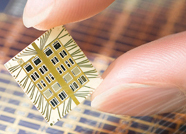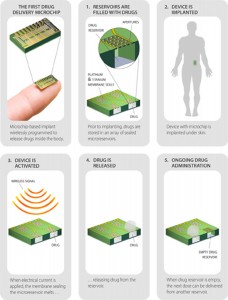To Replace Needles, Patients Could Turn to Microchips
-
-
slice.mit.edu
- 2
Filed Under
Recommended
 Patients looking for relief from medication-via-injection may be in luck, thanks to a microchip that can be implanted in the body and release drugs on command from an external wireless control.
Patients looking for relief from medication-via-injection may be in luck, thanks to a microchip that can be implanted in the body and release drugs on command from an external wireless control.Building on 15 years of work at MIT, the research was published in the February 16 online edition of Science Translational Medicine. Members of MicroCHIPS, Inc., whose research team includes Professors Robert S. Langer and Michael J. Cima, authored the study.
From Fox News:The study is believed the first attempt at using a wirelessly controlled drug chip in people. If this early-stage testing eventually pans out, the idea is that doctors one day might program dose changes from afar with the push of a button, or time them for when the patient is sleeping to minimize side effects.
“It’s like ‘Star Trek,’” said Langer, who co-authored the study. “Just send a signal over a special radio wave, and out comes the drug.”
 Microchips containing 20 doses of the osteoporosis medication teriparatide were implanted in eight Denmark women between 65 and 70 years old during 30-minute, local anesthetic procedures. In seven cases, the device delivered dosages with no negative side effects, and the women reported a preference for microchip delivery over daily injection. (The device did not work in the eighth patient and was removed.)
Microchips containing 20 doses of the osteoporosis medication teriparatide were implanted in eight Denmark women between 65 and 70 years old during 30-minute, local anesthetic procedures. In seven cases, the device delivered dosages with no negative side effects, and the women reported a preference for microchip delivery over daily injection. (The device did not work in the eighth patient and was removed.)Implanted medicine can help patients adhere to a strict medication schedule and better deliver those drugs directly to the part of the body needing care. If future trials are successful, the device could be available for clinical use in four years.
Cima and Langer originally conceived the microchip-delivery idea at MIT in the late 1990s and believe the technology could eventually improve the method of delivering multiple or potent drugs.
From WebMD:“Patient compliance is a big issue, especially when we are asking patients to give themselves daily injections of a drug,” Cima said. “This could take patient compliance completely out of the question.”
And because the devices can be controlled remotely, physicians and patients can change dosing as needed. “You could literally have a pharmacy on a chip,” Langer said.








Comments
Jagath @ Adsen…
Wed, 03/07/2012 5:25am
using a wirelessly controlled drug chip in human body is a very interesting technology. i think it's still improving
Dan Greenberg
Wed, 02/22/2012 12:08pm
The idea of saving patients from multiple injections is a good one. There is a lot of potential in multiple treatment classes. Diabetics have used insulin pumps for many years to improve treatment while reducing injections.
The idea of remote activation, while it sounds "techy" and is compelled by the idea of improving compliance, requires a lot more thought. No remote system is completely secure and commercial medical devices have demonstrated extremely poor adherence to even the most basic security measures. Several papers at BlackHat have demonstrated that current diabetes-related devices can be jammed and then set to potentially deadly outcomes. And those papers required some proximity to the device. Adding links all the way out to a physician opens many more vectors for security attacks. I am not trying to be alarmist, but let's be realistic about the true risk of remote systems that can have a direct impact on your well-being.